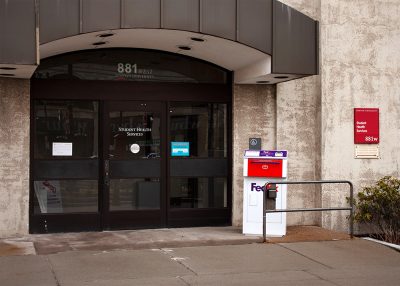Nationwide, colleges and universities are faced with a mental health crisis.

The Healthy Minds Network — a research organization that studies mental health in adolescents and young adults — found in a 2021 survey that 40% of participating college students had been diagnosed with mental health problems. 13% have had suicidal thoughts.
This “crisis” is not unique to college campuses, noted Sarah Lipson, an assistant professor at Boston University School of Public Health and co-principal investigator at The Healthy Minds Network. However, she said, students are generally afforded unique on-campus resources to deal with a broader phenomenon which is primarily affecting those in their age group.
“More students are struggling with mental health problems than are actually going and trying to access services at their counseling centers,” Lipson said. “There are a lot of inequalities in terms of what students are accessing.”
BU has seen a “steady increase in demand” for its mental health services over the past decade, one that the Behavioral Medicine department of Student Health Services has been seeking to meet, its director, Carrie Landa, wrote in an email.
“The pandemic, as well as the political climate in the US over the past several years have definitely added to that demand,” Landa wrote. “Increased isolation and loneliness are definitely a common concern when students come in.”
Landa wrote Behavioral Medicine has been hiring more staff in recent years — in 2015, its staff numbered 20 and, today, 25. For the upcoming fall semester, the department received provost approval to hire four additional therapists, two prescribers and one referral coordinator — putting the projected staff size to 32, Landa added.
However, many in the BU community said the University could offer more accessible mental health resources to its student body — among these, students, parents, student-run organizations and representatives in Student Government.
“I think the biggest question we face is, ‘I don’t know where to go,’ or, ‘I don’t know what resources are offered,’ said Savannah Majarwitz, a senior in the College of Arts and Sciences and this year’s Mental Health Committee chair within Student Government.
Currently, Behavioral Medicine offers diagnosis, therapy, psychiatry, phone consultations and a 24/7 hotline for mental health emergencies, as detailed on its website.
Students who make appointments through Behavioral Medicine — like Sage Winkler, a sophomore in the College of General Studies, and CAS junior Zoe Shiman — said they’ve often been referred to off-campus counseling after one or more meetings.
Winkler said it took her two weeks to get a consultation through SHS and at her appointment she was immediately referred to off-campus counseling.
“They sent me some recommendations of therapists, but they never reached out to make sure that I was doing well,” Winkler said.
All universities use a “brief-treatment model,” Landa wrote, adding that students who need longer-term treatment are generally referred out while those that can be treated briefly are kept in house.
“In order to serve 33,000 students, we always need to keep openings for students who need assessment and brief treatment,” Landa wrote. “Others who are referred out are often needing longer-term treatment or treatment that is beyond the scope of service for a college counseling center.”
Landa added SHS collects satisfaction data from students through a feedback process where students can provide anonymous feedback to administrators. Landa wrote that the SHS’ current student satisfaction rate is above 85%.
Majarwitz said she thinks The Wellbeing Project — created by Behavioral Medicine in September 2019 to support students’ health and wellness — should not be the only major mental health resource at BU.
“I think students would love to see more from Behavioral Medicine and more from BU in terms of the services that could be offered,” said Majarwitz.
Alessandra Kellermann, a mother of a BU alum who runs the BU Parents United Facebook group, said she believes the topic of suicide is considered taboo in discussions surrounding mental health, especially on campus.
Last month, a BU student died by suicide. Kellermann said she was contacted by parents and faculty members following the suicide, adding many “are feeling like it has gotten to a point where there are no more excuses.”
Kellermann said she thinks moving forward, BU should follow guidelines from the JED Foundation — a nonprofit organization that aims to prevent suicide in teens and young adults — on how to handle mental health crises and tragedies at academic institutions.
JED’s “Postvention Plan” focuses on “campus-wide communication and coordination aimed at maintaining community stability and assuring effective outreach during a crisis,” as described on its website.
Landa said in addition to the support provided by SHS, mental health is a “campus wide responsibility.”
“Some changes are much easier than others but we have really made significant changes over the past decade,” Landa said. “I think continuing to decrease barriers to getting care, decreasing stigma, and having students recognize that there are multiple places to turn are all ways in which we can continue to improve.”
Lipson said campus counseling services can not be expected to be able to meet the increased demand for counseling and prevalence of poor mental health symptoms in adolescents and young adults and urged the University to embrace a model of “shared responsibility” across campus.
“We are really, really taking a dangerous approach to put all of that responsibility on counseling centers because the demand is going to continue to increase,” Lipson said.
CAS sophomore Stacey Turabelidze, an e-board member of Let’s Talk About It — a student group that focuses on mental health support— said she thinks the administration could do more in providing mental health resources on campus.
“This shouldn’t all fall into our hands and it shouldn’t all be our responsibility,” Turabelidze said.
If you or a loved one are experiencing suicidal thoughts, please call The National Suicide Prevention Hotline at 1-800-273-8255 or text SHARE to the Crisis Text Line at 741741.